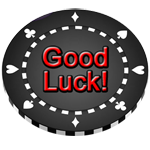Poker History and Tournaments
Poker History does not have a distinct origin and time frame due to lack of records about when it took place and who developed the game. There were speculations that Poker might have started from a single table or from a group of players in a certain area and passed on to other groups of a different area.
However, there have been some facts regarding poker history that take into account the background of the game.
Poker is said to have originated from a former French territory based in New Orleans some time between 1810 and 1825 at the famous floating saloons know as the Mississippi steamers.
During those times, poker was known to be a game with four players having five cards each from a deck of 20 cards.
Because of its name, early players of the game thought they were continuing the habit of playing a similar game known as Poque, a French card game.
Though, most historians claim that poker originated from the German game called Poch or Pochen, which started during the 15th century.
Unlike poker, poque was played by a maximum of 6 players with 32 or 36 cards in the game. The transition that took place, changing from 32 cards to 20 cards played with four players was influenced by the French game of Bouillotte or by the Persian game of As-nas.
Thus, from 1830s onwards, poker history details the anglicized name and eventually the game spreads to all parts of the United States. With a growing number of players, the game adopted the idea of having 52 cards to accommodate a larger number of players.
In the earliest form of poker, there was no draw, and bets were made on a limited series of combinations. These combinations can be one pair, two pair, triplets, four of a kind, and full, which is the only combination that has five active cards.
During those times, the adaptation of 52-card poker gave way to the introduction of another kind of combination known as flush, though straight was yet unknown.
Between 1830 and 1845, Poker history reveals an increasing number of players. It was during this time when the draw was introduced. However, the term draw was known in the English game of Brag.
The addition of the draw and flush combination increased the enjoyment of the game and created a second betting round.
Additionally, there was the introduction of Jack pots. In the old poker, jack pots refer to the rule that a player was not allowed to open unless he had a pair of jacks or better.
The purpose of introducing jack pots on poker was primarily to enforce control on the game by eliminating players who would bet on anything.
This killed the idea of bluffing or bluff as poker was originally named.
It was in 1864 when the combination of a straight sequence or rotation was introduced to poker. The addition of a straight in poker was an exhilarating development because, as experts say, without straights and straight flushes, the only high hand is four aces or four kings and an ace kicker. In the poker world, this type of combination is not just unbeatable but cannot even be matched or tied.
Because of these developments, poker consistently progressed and rapidly expanded in popularity.
This, in turn, made poker the greatest American pastime. Consequently, poker evolved from gambling to a game of skill.
Even with so many outrageous allegations regarding poker history and its origin, poker is undeniably an ultimate classical relic of American history.
Poker Tournaments Online and Off
Poker history then evolved into the excitement of tournaments played online and off. By 1970, the World Series of Poker began its reign and quickly, other tournaments followed.
Today major tournaments are held all over the country and the world. Poker tournaments are popular and are televised and watched by millions of people around the globe.
Here is a list of 7 of the better known Poker Tournaments in the US:
World Series of Poker, Las Vegas
Shooting Star, San Jose California
California State Poker Championship
5 Star Classics
Legends of Poker
Five Diamond
World Poker Finals
There are two ways of participating in a poker tournament.
First, the traditional venue, these are the casinos, poker rooms and even your kitchen table. The second is online, where you connect to a gambling site and play with a hundred players.
Online poker tournament players concentrate more on betting patterns and reaction time. They can also view statistics of their game flashed on the monitor.
Traditional poker tournament players focus more on other players’ reactions and body language, tracking the card play in their heads.
Poker history notes the difference with the rate of play in comparison. Online poker tournaments are much faster than traditional tournaments. The pace online is at blazing speed for dealing, shuffling and collecting cards.
Traditional venues are generally for the big-time gamblers, high rollers and celebrities. While online poker tournaments are usually for novice players. Bets can go as low as a penny, but can get as high as thousands of dollars.
Online poker tournaments are quite common and anyone can join.
Gambling Teachers provides more online tournament information in the lessons that follow this poker history lesson.
Some online venues also provide novice players a chance to gain entry into big money traditional poker tournaments.
An unknown, Chris Moneymaker did just that in the 2003 World Series of Poker and eventually went on to win the tournament.
Poker tournaments can be very exciting to watch on television.
But it is more exciting if you were playing instead of just being the spectator.
Some say poker originated from the Persian Empire and some say the French Monarchy. Let's leave that to poker history debates. All I know about kings and queens is a Royal Flush.
Picking Poker Tournaments follows Poker History
Return to Learn Poker Games 2
OR
How to Play Poker Program 1
OR
Continue with Online Gambling Guide
Gambling Teachers Home
GT is attentive about getting the word out about our free programs, lessons and add-ons offered, however, we ask your assistance and consideration in promoting us.
Click link below that reads, "Enjoy this page? Please pay it forward. Here's how..." to add a link to your site, blog or personal page.
Tips, Terms & Wins
Although multi table tourneys do exist in the real life poker world, the size of these poker tournaments in the online world is unrivalled.
The most popular poker sites routinely draw tournaments with thousands of players, particularly if the entry fee is priced low.





